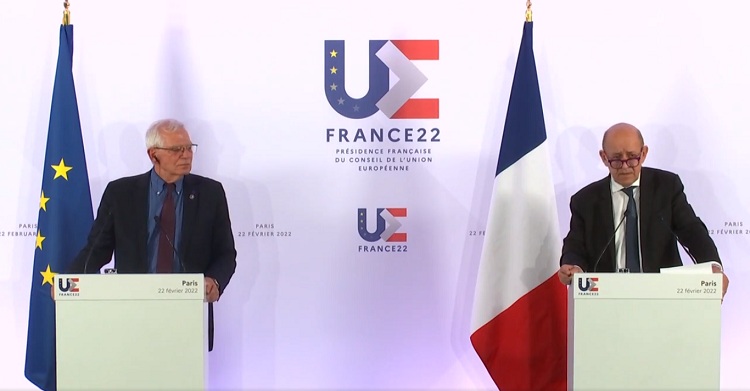Eduardo González
Foreign Minister José Manuel Albares and the rest of his EU counterparts approved yesterday in Paris the first package of sanctions against Russia in retaliation for President Vladimir Putin’s decision to recognize the self-proclaimed republics of Lugansk and Donetsk in Ukraine and to order the deployment of troops in these territories.
“We have unanimously agreed on the first package of sanctions,” announced French Foreign Minister Jean-Yves Le Drian during the press conference following the informal meeting, which was urgently convened by the High Representative for Foreign Policy of the European Union, Josep Borrell, taking advantage of the meeting in Paris of the forum of European and Asia-Pacific ministers convened by the French Presidency of the Council of the EU.
These sanctions, which “have yet to be formally approved by the EU”, will affect some thirty “entities and individuals, including some decision-makers who have played an important role in the attack on Ukraine’s sovereignty”, Josep Borrell specified at the same press conference. They will also, he continued, prevent Russia’s access to “our financial and capital markets” so that it cannot finance its debt on the European markets. According to the High Representative, the sanctions, which “will damage Russia, and damage it a lot”, should not be incompatible with the EU’s diplomatic efforts to prevent “a new eruption of war in the heart of Europe”, because “the risk of a large-scale conflict is real and we have to prevent it”.
Ahead of the meeting, the presidents of the European Commission, Ursula Von der Leyen, and of the European Council, Charles Michel, advanced in a joint statement that the main targets of the sanctions will be “the banks that are financing military and other operations” in Donetsk and Lugansk and the “trade from the two separatist regions to and from the EU, to ensure that those responsible clearly feel the economic consequences of their illegal and aggressive actions.” These measures replicate, in fact, those already in place since 2014 as a consequence of Russia’s illegal annexation of Crimea and the city of Sevastopol. For his part, the German Chancellor, Olaf Scholz, announced yesterday his government’s decision to block the certification process of the Nord Stream 2 gas pipeline “in the context of the escalating conflict between Russia and Ukraine”.
Albares: “Spain will make its voice heard with force to defend the international order”
At the end of the meeting, José Manuel Albares declared that Spain wants “the territorial integrity of Ukraine to be respected and therefore supports the sanctions” and announced the offer of humanitarian aid to the Ukrainian government through the European Civil Protection Mechanism. The aid will be “mainly in the form of medical supplies” and, “of course, it will not be military material”, he specified. The Ukrainian Foreign Minister himself, Dmytro Kuleba, reported yesterday, via Twitter, that he had had a telephone conversation with Albares in which the latter assured him that “Spain supports the EU sanctions against Russia and prepares additional practical support for Ukraine.” “I thank Spanish friends for supporting Ukraine in these tense times,” he added.
“We Europeans are showing solidarity, unity and determination,” Albares also told journalists. “What we are talking about is the indivisibility of Europe’s security and what is at stake right now is peace in Europe and the order on which Europe has been based after World War II, an order based on predictable rules, on the sovereign equality of all states, on respect for the borders and territorial integrity of all states, on peace, on the abolition of war as a way of resolving conflicts,” he continued. “Of course, Spain will make its voice heard with force so that this order remains the same,” he added.
Likewise, the Minister announced that today he will appear before the Foreign Affairs Committee of the Congress, at his own request, to address the crisis in Ukraine. “Tomorrow (today) I will appear again to explain the situation on the ground and the decisions taken with the rest of the partners and to seek the unity of the Spanish political forces at a time of challenge to the order of peace, prosperity, respect for sovereignty and territorial integrity in Europe,” he declared. This is the second appearance of Albares in a month related to the crisis in Ukraine, after the one he made on January 25.






